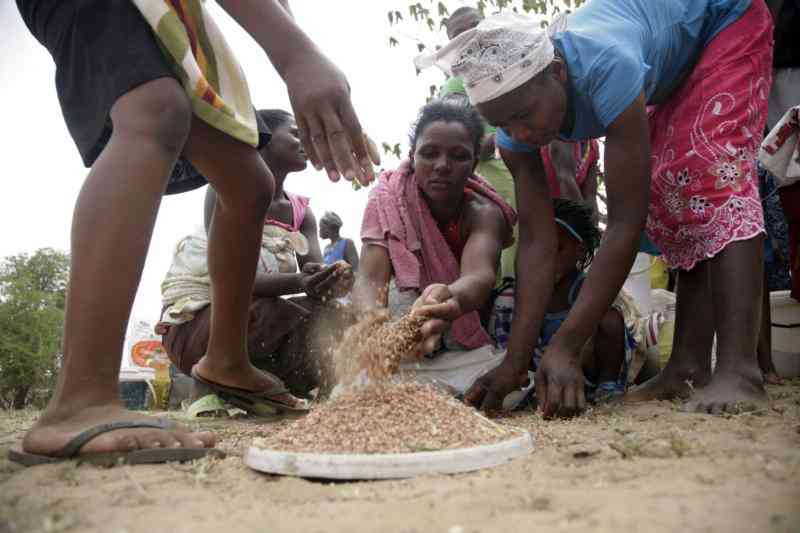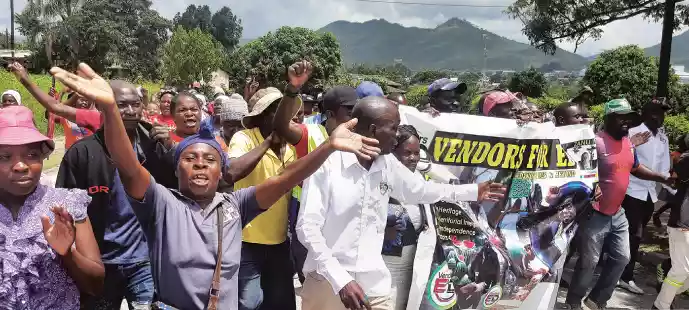
There were days when Abel Ncube (12) and his classmates were so exhausted on their way home from school that they lay down among the thorny scrub that covers Nkayi district, Matabeleland South, and slept.
Having suffered the whole day without a mouthful of food, the two-hour walk back home was too much to bear.
But since January, the boys’ homeward trek has improved, after a charity began supplying food to the school.
Unlike other organisations providing vital support in Zimbabwe, Mary’s Meals International, or MMI, is set on continuing its work despite global aid funding cuts.
“Even if we get home and there is nothing to eat, at least we have had some food at school,” Abel told Devex, on a recent visit to Amazwimabili Primary School.
Abel is among 3,5 million children in rural Zimbabwe experiencing crisis-level food insecurity caused by an extreme 2024 El Niño-induced drought, according to Unicef.
Some 7,6 million people in areas dependent on subsistence farming have been impacted, with food shortages driving more than 22% of children out of school.
United Kingdom-based charity MMI, which began delivering school feeding programs in Zimbabwe in 2018, has responded to the emergency by expanding its reach.
Working with two local partner NGOs: Organisation of Rural Associations for Progress, or ORAP, and Mavambo Orphan Care, as well as the Zimbabwean government, it provides more than 179 000 children with one hot meal every weekday of the school year, in more than 350 primary schools.
This work provides a lifeline, not only because of the climatic challenges, but because its partner organizations, other Zimbabwean NGOs, and United Nations agencies are scaling back projects after the US government shuttered the U.S. Agency for International Development — once the world’s largest aid donor.
Zimbabwe is facing a funding loss of US$83 million due to USAid cuts — representing a 35% cut of the country program, according to Centre for Global Development estimates.
Fortunately for children like Abel, this has not impacted MMI. “We are hugely fortunate that a significant proportion of our income comes from what we refer to as our grassroots funding,” said MMI director of programme affiliates and partners Alex Keay.
“That’s members of the general public … who are really committed and passionate supporters of our work.”
The charity raised more than US$18,3 million in funding from donations and legacies in 2024, according to its annual report, compared to just under £5 million from grants and trusts.
This included restricted funds from the UK Foreign, Commonwealth & Development Office of just over £700 000 for work in Liberia.
But the organiSation has not received any further grants from the department since last year, Keay added.
“We’re always really grateful for that institutional funding where it's available, but we have much more flexibility to work in places in a way that we feel is most impactful by having the freedom of choice that comes from grassroots funding,” he said.
With this funding model, MMI has committed to keep feeding children in Zimbabwe for as long as it is needed.
As Devex observed at other schools in the region, Amazwimabili Primary School has seen pupil enrolments and attendance rise as a result of the food.
Deputy head teacher Fanta Khumalo told Devex that 39 pupils had returned to school, bringing the total number aged from four to 15 up to 554.
“Before the children were afraid to come to school with empty tummies,” she said, looking out across the parched land between the school’s buildings.
“Teachers have reported children are not complaining about hunger anymore and absenteeism has been addressed,” Khumalo said.
Khumalo described how up to half of the children live in households headed by grandparents.
Parents migrate to South Africa or cities in Zimbabwe to find work.
The average household includes between seven and 11 children, she said.
Abel lives with his grandparents and six younger siblings and cousins.
He has to fetch water from a well before he walks to school.
“My parents rarely come home or send any money,” he says. “They cannot find any work.”
An impact survey by ORAP, seen by Devex, suggested that before school feeding began, 48% of children reported they were able to concentrate in class. But afterwards, this increased to 93%.
ORAP is MMI’s delivery partner in Umguza, Nkayi, and Bubi districts in the southern part of Matabeleland North province.
After visiting Amazwimabili Primary School, ORAP CEO Mvuselelo Huni sat down with Devex to explain how providing food was preventing children from abandoning school to seek unskilled jobs to support their families, including herding cattle, working as house maids, or even in illegal mines.
“For a lot of girls that don’t go to school, it’s very easy for them to fall pregnant and simply be married,” she said. According to Unicef more than 33% of girls in the country marry before they turn 18.
UN agencies operating in Zimbabwe also face funding shortfalls. The World Food Programme provided food assistance to almost 360 000 children in Zimbabwe last year.
But according to its latest country brief, it lacks 65% of operational requirements for June to November 2025, to the value of US$31,1 million.
This was slightly alleviated earlier this month, with a US$1,3million contribution from the government of Japan.
In its latest situation report, Unicef Zimbabwe declared a funding gap of US$32 million. Alexandra Makaroff, the country office’s chief of partnerships, advocacy, and communication, told Devex over email that it no longer delivers school feeding directly, but instead implements a school improvement grants programme — with other partners — funded by the Global Partnership for Education, or GPE.
This encourages schools to establish livelihood projects.
“The programme fosters the learning institutions’ self-reliance and resilience by incorporating projects in orchards such as small livestock (goats, poultry, rabbits), orchards, and nutrition gardens,” she said.
Makaroff said it was difficult to assess the result of USAid funding cuts on Unicef’s work in Zimbabwe.
She said it had to return the remainder of grants for HIV financing and cholera response to Unicef’s headquarters, but that the amounts were small as the programmes had almost ended.
The department was allowed to continue its activities to eradicate polio.
However, she said funding the country office received from Gavi, the Vaccine Alliance and GPE, through its head office might be impacted by USAid cuts in the future.
She added that USAid had contributed to the care group model, which is related to the work of village health workers.
“Budget cuts are definitely impacting these efforts at country level,” Makaroff said.
The Zimbabwean government also delivered its own Emergency School Feeding Programme. In 2020, this reached nearly 2,5 million children nationwide.
It continues supporting some schools through a homegrown school feeding model, which was formerly supported by Unicef and the German government, where it supplies schools with grain, and encourages parents to contribute to purchasing the accompanying relish — a sauce or stew.
Back at Amazwimabili Primary School, Abel was unaware of the macro-level funding crisis impacting his country’s global development sector. With his regular cup of nutritious porridge in his hands, he had the energy to play soccer once more and think about his future.
He asked for a replacement pen, as one of the two he had in his faded shirt pocket was out of ink. “I want to go to secondary school,” he said with a smile.










